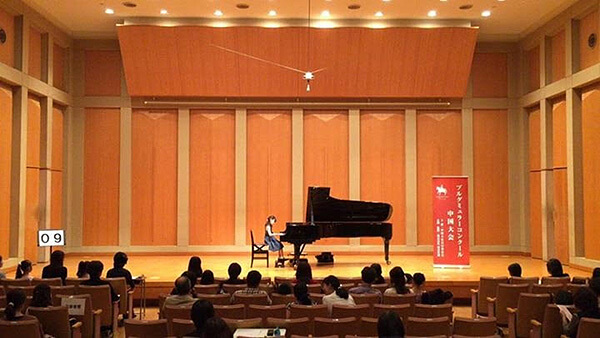How Do We Use the PTNA Affiliated Competitions? 100 Venues in 2016
2017/02/27 | コメント(0)
| トラックバック(0)
|
 PTNA affiliated competitions' network has been widened since 2010. The number of venues has reached 100, and nearly 8,000 have participated in 2016. The characteristics and purposes of affiliated competitions vary. The Burgmuller Competition is frequently used for the first step to the competition experience, while the Sonata Competition is regarded to learn the sonata form in classical period in depth. More than half of the entire participants had also participated in PTNA Piano Competition and/or PTNA Piano STEP in the past, but nearly 1/4 apply for PTNA-related events for the first time. They are also expected to continue music learning and making through those public stages.
PTNA affiliated competitions' network has been widened since 2010. The number of venues has reached 100, and nearly 8,000 have participated in 2016. The characteristics and purposes of affiliated competitions vary. The Burgmuller Competition is frequently used for the first step to the competition experience, while the Sonata Competition is regarded to learn the sonata form in classical period in depth. More than half of the entire participants had also participated in PTNA Piano Competition and/or PTNA Piano STEP in the past, but nearly 1/4 apply for PTNA-related events for the first time. They are also expected to continue music learning and making through those public stages. Here are two competitions that are newly joined in this network. Coincidentally, both are targeted at popular music lovers. The Roland Piano Music Festival, which is conducted in a competitive setting, calls for participants who will perform solo or ensemble with music data (chosen from required repertoires which are mainly popular music). The final round will be ensemble with the festival special orchestra. The 1st Cristal Competition organized by the Tokyo Popular Station (representative: Tomoko Sadohara) will call for participants in two sections; the arrangement style (arrangement of classical pieces), and the popular style. The aim of this competition is to enjoy the music with participants, jury members, and the audience altogether.
Then, how do piano teachers use those affiliated competitions?
Yuri Matsunaga (representative of the Yokohama Kravier Art Station, administrative member of the Burgmuller Competition Tokyo venue) is one of the most active teachers. In the beginning of each year, she shows her students the annual plan of the public stage opportunities; Studio Concert and PTNA Piano STEP, Public Lessons, and Competitions. She tries not only to envision those goals, but also the steps afterward. "Especially when students cannot reach their goals or receive the favorable results, teachers should offer something that complement them", says Matsunaga. Sometimes she recommends less difficult repertoires for a competition, and at the same time, offers a little bit difficult pieces to aim for a higher goal in the PTNA Piano STEP a few weeks / months ahead. In this case, competitions work as an incentive to keep their motivations.
Yuri Matsunaga (representative of the Yokohama Kravier Art Station, administrative member of the Burgmuller Competition Tokyo venue) is one of the most active teachers. In the beginning of each year, she shows her students the annual plan of the public stage opportunities; Studio Concert and PTNA Piano STEP, Public Lessons, and Competitions. She tries not only to envision those goals, but also the steps afterward. "Especially when students cannot reach their goals or receive the favorable results, teachers should offer something that complement them", says Matsunaga. Sometimes she recommends less difficult repertoires for a competition, and at the same time, offers a little bit difficult pieces to aim for a higher goal in the PTNA Piano STEP a few weeks / months ahead. In this case, competitions work as an incentive to keep their motivations.
Those challenges are not only for students. They also give her chances to review herself as a teacher, by receiving written comments from jury members or advisors. Furthermore, as an organizer of STEP and an affiliated competition, she is able to connect with local teachers and to learn each other. For her, affiliated competitions are just like this structure, which complement one another to enliven the music learning.
Kanako Kuroda (Hokkaido) says that competitions enable her students to learn pieces and bring them into completion in a certain period of time. She tries to set musical goals, such as learning music by heart, making good balance between right and left hands, etc, so as not to focus on results too much. She is pleased to see her students developed tremendously through competition experiences. One of them proceeded to the final round in the Bach Competition a few years ago, and that encouraged him to take on a new challenge. Last year, he participated in the PTNA Piano Competition (grade C) and proceeded to the regional final round. He had thought that PTNA Competition was too difficult for him, but the prior experience in the Bach Competition inspired him and decided to work toward the new goal. "Performances in public inspire children a lot, not only at concert stages, but also at school events. For example, I was surprised to see how their sight reading became faster. Their attitudes change dramatically in daily lessons."
Yuri Tanaka (Osaka) has a student similar to this episode. In her studio, she regards the purpose of each public stage as follows; STEP for refining the quality of interpretations and performances, studio concert for keeping motivation and endurance, and competitions for giving the momentum for learning music.
【GoogleAdsense】